THE SCIENCE OF PEAK PERFORMANCE
Humans are naturally curious and driven to seek improvement and growth in various areas of their lives, including their performance. Peak performance refers to a state of optimal functioning in which individuals can perform at their best, whether it be in sports, academics, work, or other areas of life.
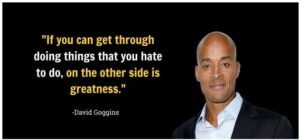
Whenever I think of Peak Performance one real-life story that crosses my mind is that of the retired US Navy Seal David Goggins. David Goggins overcame mediocrity to become a peak performer. As a child, Goggins was overweight and struggled academically. He faced racism and abuse at home and school, and his father was physically abusive towards him and his mother. Despite these challenges, Goggins knew he was capable of more and decided to join the military.
After completing his service in the military, Goggins struggled to find his purpose in life. He gained weight and became complacent, until one day he saw a TV program about the Navy SEALs and was inspired to become one of them. However, at that time, he was overweight, had never swum before, and had very little experience with physical exercise. He started swimming and training for the Navy SEALs. But the road was far from easy. He suffered numerous injuries, including stress fractures and shin splints. He failed the SEAL training three times, and it seemed like he would never be able to achieve his dream. But Goggins refused to give up. He developed an unbreakable mindset and turned his weaknesses into strengths. He started visualizing success and set specific, measurable goals to achieve his dreams. He also developed an intense work ethic and pushed himself beyond his limits.

Eventually, Goggins achieved his dream of becoming a Navy SEAL and went on to serve in the United States Air Force Tactical Air Control Party. But his achievements didn’t stop there. He continued to push himself to the limit, completing multiple ultra-marathons, including the Badwater 135, which is considered one of the toughest races in the world.
Goggins’ story is a testament to the power of perseverance, hard work, and an unbreakable mindset. He overcame his weaknesses and transformed himself from a mediocre person to a peak performer, achieving success in multiple dimensions of performance. He continues to inspire others to push themselves beyond their limits and achieve their dreams, no matter how impossible they may seem. David Goggins continues to inspire people like me to scorn lives of mediocrity and become peak performers.
There are several reasons why people are fascinated by peak performance. First, achieving peak performance can be incredibly rewarding and satisfying, as it allows individuals to experience a sense of accomplishment and mastery. This can be especially true if the individual has worked hard and overcome challenges to reach their peak performance level.
Additionally, peak performance can lead to various benefits, such as increased confidence, greater success in personal and professional endeavours, and improved physical and mental health. When people experience the benefits of peak performance, they often become motivated to continue striving for excellence in other areas of their lives as well.
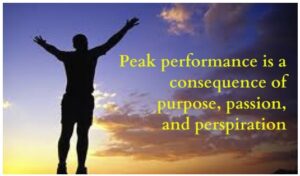
Finally, embracing the pursuit of peak performance can lead to a more fulfilling and meaningful life. When people are actively engaged in pursuing their goals and working towards their full potential, they often feel more purposeful and satisfied with their lives overall.
Therefore, everyone needs to embrace the pursuit of peak performance, as it can lead to a richer, fuller life. Whether it be through setting challenging goals, engaging in deliberate practice, or seeking out resources and support, there are many ways to work towards achieving peak performance and reaping the benefits that come with it.
My journey from mediocrity to where I am today has some elements of David Goggins’s journey though it lacks the toughness and intensity of what Goggins has so far endured and achieved in his life. When I reflect on my life, I am reminded of a journey that was marked by its twists and turns, highs and lows, and above all, an unwavering determination to achieve peak performance. Born into a family of modest means, I was brought up with the values of hard work and perseverance. These values served me well as I navigated my way through life, facing challenges and overcoming obstacles, and ultimately transforming myself into a peak performer.
My journey began in college, where I struggled to keep pace with my peers. Despite my mediocrity, I persevered and completed my PhD in Microbiology from the prestigious and premier Indian Agricultural Research Institute, New Delhi. To become a Scientist, I wrote the ARS (Agricultural Research Service Examination) in 1991 conducted by the Indian Council for Agricultural Research (ICAR) and topped the examination. I then took the Indian Forest Service Examination in 1991 and secured an all-India rank of number 6. Following this, I appeared in the Indian Civil Services Examination conducted by the Union Public Service Commission in 1991 and passed it successfully with the 146th all-India rank and joined the Indian Police Service (IPS) in 1991.
At first, my professional journey was marked by success and achievement. I was proud of what I had accomplished and the position of authority that came with it. However, as the years passed, I found myself slipping into a life of comfort and mediocrity. The allure of the perks and the power that came with the job had seduced me into a complacent existence, and I was content to simply exist without challenging myself.
It wasn’t until my fiftieth year that I realized the error of my ways. I realized I was happy, but I was not fulfilled. There was a void in my life that could only be filled by a new challenge, a new goal to pursue. I decided to change my life and began my journey into peak performance.
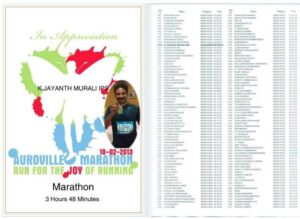
I started by waking up early, meditating, working out, running, and reading and writing all simultaneously. These personal investments in the form of the above activities and discipline started transforming my life. Within a year, I had run my first full marathon at Auroville in February 2013 at 3 hrs 48 minutes, and I soon started writing a column in the Deccan Chronicle. Professionally, I started getting entrusted with more challenging and sensitive assignments. I got posted as ADGP Administration and a little later with the prestigious post of ADGP CBCID. There was no looking back after that. I found myself getting posted to the most prestigious and plum assignments like Director Vigilance and Anti-Corruption not once but twice and also as ADGP Law and order not once but twice.
In CBCID as Secretary of the All India Police Duty Meet, I led Tamilnadu Police to first place among the different police forces in the country. And in 2019, I published my first book, 42 Mondays. I was able to achieve so much because of adopting habits of peak performance. I am today an author of four books and have given back so much to society by raising funds for Covid 19 pandemic , Kidney Foundation, and organ donation in Chennai.
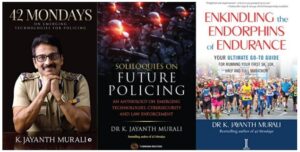
Through my journey, I have come to understand that peak performance is not just about achieving success or setting goals. It is about adopting a mindset of constant self-improvement, of always striving to be better than you were yesterday. It is about taking control of your life and your destiny and not being content to simply exist.
As I look back on my life, I am grateful for the challenges I faced, the struggles I overcame, and the opportunities that lay ahead. My journey has taught me that with hard work, determination, and a willingness to push yourself to your limits, anything is possible.
PEAK PERFORMANCE – DEFINITION AND SCIENCE OF PEAK PERFORMANCE
Peak performance can be defined as the state of being at one’s best, achieving optimal performance in a particular task or activity. The science of peak performance seeks to understand the underlying mechanisms that enable individuals to perform at their highest potential and how these mechanisms can be optimized to improve performance. This module provides an overview of the scientific basis of peak performance, exploring key concepts, theories, and evidence-based approaches for optimizing human performance across various dimensions.
Dimensions of Peak Performance
Peak performance involves multiple dimensions of performance, including cognitive, emotional, social, and physical dimensions. Each of these dimensions plays a critical role in enabling individuals to perform at their best.

Cognitive Performance
Albert Einstein is perhaps the most famous example of someone who has achieved peak cognitive performance. His groundbreaking work in physics and mathematics revolutionized our understanding of the universe. His ability to think critically, creatively, and deeply about complex problems has inspired generations of scientists and thinkers. Cognitive performance refers to the ability to process and use the information to perform mental tasks effectively. This dimension of performance includes attention, memory, perception, and decision-making. Research has shown that cognitive performance can be improved through various interventions, such as cognitive training, brain stimulation, and mindfulness practices.

Emotional Performance
Emotional performance refers to the ability to regulate emotions effectively and maintain a positive emotional state, even in the face of stress or adversity. Emotional performance is essential for individuals in high-stress environments, such as athletes, military personnel, and emergency responders. Techniques such as relaxation, cognitive restructuring, and emotion regulation have been shown to improve emotional performance. One of the most inspiring examples of emotional performance is Kobe Bryant. The basketball legend was known for his intense focus and ability to perform at his best under immense pressure. Despite facing setbacks and obstacles, Kobe remained dedicated and focused, and his emotional intelligence helped him navigate through difficult times.
Social Performance
Oprah Winfrey is a prime example of someone who has mastered social performance. As a media mogul and philanthropist, she has built a successful brand by connecting with her audience and using her platform to bring about positive change. Her ability to build strong relationships and communicate effectively has been the foundation of her success. Social performance refers to the ability to communicate effectively, work collaboratively, and build positive relationships with others. Social performance is essential in various domains, including business, education, and sports. Strategies such as communication skills training, team-building exercises, and coaching have been shown to improve social performance.
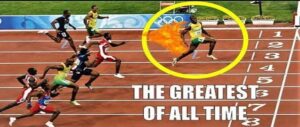
Physical Performance
Physical performance refers to the ability to perform physical tasks effectively, such as running, jumping, and lifting weights. Physical performance is critical in sports, military, and first responder contexts. Strategies such as strength training, aerobic exercise, and nutrition have been shown to improve physical performance. Usain Bolt is one of the greatest athletes of all time and a prime example of someone who has achieved peak physical performance. His speed and agility on the track have been unmatched, and he has broken numerous records throughout his career. His rigorous training and dedication to his craft have made him a true champion.
Interactions Between Dimensions
The various dimensions of performance are interconnected, and optimal performance requires a balance between them. For example, cognitive performance can be influenced by emotional and physical factors. Stress can impair cognitive performance, while exercise and good nutrition can enhance it. Similarly, emotional performance can be influenced by cognitive and social factors. Cognitive reappraisal, a cognitive strategy for changing emotional responses, can improve emotional regulation. Building positive relationships and social support can also improve emotional performance.
Key Concepts in Peak Performance
Several key concepts underpin the science of peak performance, including the following:

Expertise
Expertise refers to the level of knowledge and skill an individual has in a particular domain. Research as shown that expertise is a critical predictor of performance in various domains, including sports, music, and chess. Expertise is developed through deliberate practice, which involves engaging in focused, repetitive practice with specific goals and feedback. Steve Jobs was a visionary entrepreneur and a master of expertise. He built one of the most successful companies in history, Apple, by innovating and pushing the boundaries of technology. His deep knowledge of design, engineering, and marketing was the foundation of his success.
Flow
Flow is a state of intense focus and absorption in an activity, where individuals feel fully engaged and in control of their actions. Michael Jordan is an example of someone who achieved peak performance through flow. He was known for his ability to get into the zone on the basketball court, where he felt completely immersed in the game and time seemed to slow down. This state of flow allowed him to perform at his best and become one of the greatest athletes of all time. Flow is often described as being “in the zone,” and is associated with optimal performance in various domains, including sports, music, and work. Flow is characterized by a balance between challenge and skill, where the task is challenging enough to be engaging but not so difficult that it causes anxiety or frustration.

Grit
Grit is the ability to persevere and maintain an effort towards long-term goals despite setbacks and obstacles. Grit is a critical predictor of success in various domains, including education, sports, and business. Grit involves a combination of passion, persistence, and resilience. J.K. Rowling is an inspiring example of someone who achieved peak performance through grit. She faced rejection after rejection before finally getting her first book, Harry Potter and the Philosopher’s Stone, published. Her perseverance and determination to succeed have made her one of the most successful authors of all time.

Mindset
Mindset refers to the beliefs and attitudes individuals hold about their abilities and potential. Serena Williams is an example of someone who has achieved peak performance through a winning mindset. She has a strong belief in her abilities and can maintain a positive attitude even in the face of adversity. Her mental toughness has helped her become one of the greatest tennis players of all time. Research has shown that mindset can influence performance in various domains, including sports, education, and business. Individuals with a growth mindset believe that their abilities can be developed through effort and hard work, while those with a fixed mindset believe that their abilities are fixed and unchangeable. A growth mindset is associated with better performance, greater persistence, and more positive emotional experiences.
Goal Setting
Goal setting is the process of identifying specific, measurable, and challenging goals that motivate and guide behaviour. Research has shown that goal setting is an effective strategy for improving performance in various domains, including sports, education, and business. Effective goal setting involves setting clear and challenging goals, monitoring progress and providing feedback. Elon Musk is a visionary entrepreneur who has achieved peak performance through goal setting. His ambitious goals, such as colonizing Mars and revolutionizing transportation, have inspired his team and pushed them to achieve great things. His ability to set big, audacious goals and then work tirelessly to achieve them is a testament to his success.
Without clear and specific goals, it is difficult to know what steps to take to achieve success. To set effective goals, I follow the SMART criteria, which stands for Specific, Measurable, Achievable, Relevant, and Time-bound. One of my personal goals was to write a book, and I used the SMART criteria to guide me. I set a specific goal to write a 50,000-word novel, with measurable progress tracked through word count, and achievable milestones set for each week. The goal was relevant to my passion for writing and time-bound by setting a deadline to finish within six months. A famous example of goal setting is Michael Jordan, who famously set a goal to win six NBA championships. He used this goal to guide his training, practice, and game-day performance, ultimately leading him to achieve his goal and become one of the greatest basketball players of all time. Setting clear and measurable goals is also critical to achieving peak performance. Olympic swimmer Michael Phelps is an excellent example of someone who has mastered the art of goal-setting. Throughout his career, he set both short-term and long-term goals for himself, and he consistently achieved them through dedication and hard work.
Evidence-Based Approaches for Peak Performance
There are several evidence-based approaches for optimizing performance across various dimensions:
Cognitive Training
Cognitive training involves engaging in specific exercises designed to improve cognitive abilities, such as attention, memory, and decision-making. Brain games, such as crossword puzzles, Sudoku, and memory games, are popular forms of cognitive training. These games challenge different aspects of cognitive function and can improve overall cognitive performance with practice. Research has shown that cognitive training can improve cognitive performance in healthy adults, older adults, and individuals with cognitive impairments.

One famous personality who achieved peak performance through cognitive training is chess grandmaster Magnus Carlsen. Carlsen is known for his exceptional memory and ability to calculate complex moves quickly. He attributes his success in part to his regular practice of solving chess puzzles and studying game strategies. He also incorporates mindfulness meditation into his training routine to improve his focus and reduce stress during tournaments. Through his dedicated cognitive training, Carlsen has achieved numerous accolades, including becoming the youngest chess player to reach the number one ranking at the age of 19.

Brain Stimulation
Brain stimulation involves using non-invasive techniques, such as transcranial magnetic stimulation (TMS) and transcranial direct current stimulation (tDCS), to modulate brain activity and improve cognitive performance. A famous example of brain stimulation is chess grandmaster Garry Kasparov. He used visualization techniques to prepare for matches, mentally playing out various scenarios to improve his strategic thinking and decision-making skills. Research has shown that brain stimulation can improve various cognitive abilities, such as working memory, attention, and decision-making. Leonardo da Vinci is an example of someone who achieved peak performance through brain stimulation. He was a polymath who excelled in multiple fields, including art, science, and engineering. He believed in constantly challenging his mind and seeking out new experiences to stimulate his creativity and intellect.
Mindfulness Practices
Mindfulness practices involve engaging in activities that promote present-moment awareness and non- judgmental acceptance of thoughts and feelings. Mindfulness practices, such as meditation and yoga, have been shown to improve cognitive, emotional, and physical performance in various domains. Arianna Huffington is an example of someone who achieved peak performance through mindfulness. She is a successful entrepreneur and media personality who has written extensively on the importance of mindfulness and meditation for improving productivity and well-being. Her commitment to mindfulness has been a key factor in her success.

Relaxation Techniques
Relaxation techniques, such as progressive muscle relaxation and deep breathing, have been shown to improve emotional and physical performance. These techniques can reduce stress and promote relaxation, which can improve emotional regulation and physical performance. One technique I use is deep breathing exercises, taking slow, deep breaths to calm my mind and body. Another technique is progressive muscle relaxation, which involves tensing and releasing muscles throughout the body to reduce tension and promote relaxation. LeBron James is an example of someone who achieved peak performance through relaxation techniques. He is known for his rigorous training regimen, but he also understands the importance of rest and recovery. He uses techniques such as meditation, yoga, and massage to relax his body and mind and stay.
Strength Training
Strength training involves engaging in resistance exercises, such as weightlifting, to build muscle strength and endurance. Strength training has been shown to improve physical performance in various domains, including sports, military, and first responder contexts. To optimize performance, it is important to vary your workouts and focus on compound exercises, which work for multiple muscle groups at once. One of my favourite strength training exercises is the deadlift, which works the entire body, improving strength and power. I also incorporate bodyweight exercises, such as push-ups and squats, to improve endurance and overall fitness. A famous example of strength training is Arnold Schwarzenegger, who famously incorporated weightlifting into his bodybuilding routine to become one of the most successful bodybuilders of all time.
Aerobic Exercise
Aerobic exercise involves engaging in activities that increase heart rate and breathing, such as running, swimming, or cycling. One of my favourite aerobic exercises is running, which improves cardiovascular fitness and endurance. I also incorporate HIIT workouts, such as sprint intervals, to improve overall fitness and performance. A famous example of aerobic exercise is Usain Bolt, who incorporated sprinting into his training routine to become one of the fastest runners in history. Aerobic exercise has been shown to improve physical and cognitive performance in various domains. Aerobic exercise is another important component of physical performance, improving cardiovascular fitness and endurance. To optimize performance, it is important to vary your workouts and include both high- intensity interval training (HIIT) and steady-state cardio.
Nutrition
Nutrition is a crucial component of peak performance, providing the body with the fuel it needs to perform at its best. To optimize performance, it is important to eat a well-balanced diet, focusing on hole foods and avoiding processed and sugary foods. I follow a diet rich in lean protein, complex carbohydrates Nutrition plays a critical role in physical performance, as it provides the necessary nutrients for muscle growth and repair. A balanced diet that includes adequate protein, carbohydrates, and fats is essential for optimal physical performance.
Conclusion
The science of peak performance seeks to understand the underlying mechanisms that enable individuals to perform at their highest potential and how these mechanisms can be optimized to improve performance. Peak performance involves multiple dimensions of performance, including cognitive, emotional, social, and physical dimensions. These dimensions are interconnected, and optimal performance requires a balance between them. Key concepts in peak performance include expertise, flow, grit, mindset, and goal setting. There are several evidence-based approaches for optimizing performance, including cognitive training, brain stimulation, mindfulness practices, relaxation techniques, strength training, aerobic exercise, and nutrition. I’ve also found that brain stimulation, such as through reading or learning a new skill, can help to enhance cognitive performance. By challenging my brain, I’ve been able to improve my memory, focus, and creativity. Additionally, practising mindfulness and relaxation techniques, such as meditation and deep breathing, have helped me to reduce stress and improve my overall well-being.

Lastly, I believe that nutrition and exercise play a vital role in achieving peak performance. Eating a healthy diet and staying active can help to boost energy levels and improve physical and mental health. I make sure to incorporate both strength training and aerobic exercise into my routine, and I fuel my body with nutritious foods that provide the nutrients I need to perform at my best.
In conclusion, achieving peak performance is a multifaceted process that requires a combination of emotional, social, physical, cognitive, and nutritional factors. By focusing on developing grit, embracing a growth mindset, setting clear goals, engaging in brain stimulation and mindfulness practices, and maintaining a healthy lifestyle, anyone can achieve their peak potential By understanding the science of peak performance and implementing evidence-based approaches, individuals can improve their performance across various domains and achieve their goals.
 Dr K. Jayanth Murali is a retired IPS officer and a Life Coach. He is the author of four books, including the best-selling 42 Mondays. He is passionate about painting, farming, and long-distance running. He has run several marathons and has two entries in the Asian book of Records in full and half marathon categories. He lives with his family in Chennai, India. When he is not running, he is either writing or chilling with a book.
Dr K. Jayanth Murali is a retired IPS officer and a Life Coach. He is the author of four books, including the best-selling 42 Mondays. He is passionate about painting, farming, and long-distance running. He has run several marathons and has two entries in the Asian book of Records in full and half marathon categories. He lives with his family in Chennai, India. When he is not running, he is either writing or chilling with a book.
